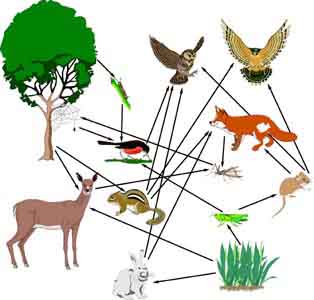Interactions
(Copyright 2000 McREL; Used with permission)
The simplistic image above is
depicting energy flow from producers all the way up
to tertiary consumers. Also known as food web,
the arrows within are pointing toward organisms that
consume the previous organism. For instance,
the Rattus norvegicus has three arrows pointing
toward a fox, owl, and hawk. These are
considered the predators or tertiary
consumers. On the other hand there is an arrow
pointing toward the brown rat from a grasshopper
making the brown rat a secondary consumer.
This food web happens to take place in a terrestrial
environment.
The five
trophic levels consist of primary producers, primary
consumers, secondary consumers, tertiary consumers,
and quarternary consumers. Primary producers
use photosynthesis to create sugars and organic
compounds which aid in cellular respiration for
growth. Primary consumer are herbivores that
eat plants and other primary producers; the flow of
energy is then transferred from the primary
producers to the primary consumer. However,
the organism on the receiving end will only obtain a
portion of the energy. According to the second
law of thermodynamics, energy conversions can't be
completely efficient; some of the energy is lost
through heat. [2] Furthermore, secondary
consumers are carnivores that eat herbivores while
tertiary consumers eat other carnivores.
Lastly, quarternary consumers eat tertiary
consumers. The flow of received energy
through nutrients lessens as you move up the food
chain. The picture of the food chain for
terrestrial and aquatic environments may help with
clarity.
I found a video on youtube.com showing the Rattus norvegicus being targeted as a food source by the Grey Heron. Two species in their natural habitat both expressing transfer of Energy. Ideally, Luck plays a role in living. Grey Heron vs. Rattus norvegicus
Another video is an intense battle between the weasel and brown rat. Survival of the fittest. weasel vs. brown rat
Previous to: Reproduction Next to: Facts

